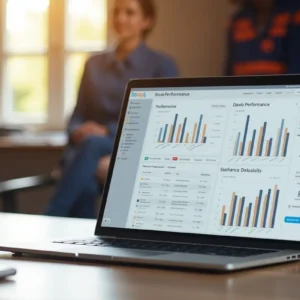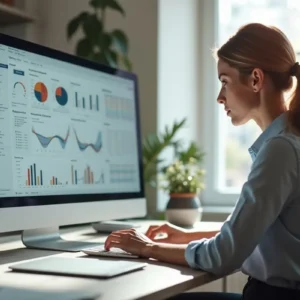Personal finance can be confusing, especially when it comes to spending and budgeting.
That’s why so many people choose to monitor their transactions. By tracking where your money goes, you can more easily see where you might be able to save.
And monitoring transactions don’t have to be hard. There are plenty of tools and apps that can help you do it.
Here are ten benefits of monitoring your transactions:
Contents
- 1 1. You Can Easily Keep Track of Your Finances
- 2 2. You Can Easily Find Errors in Your Recordkeeping
- 3 3. You Can Compare Your Spending to Others
- 4 4. You Can See How Much Money Is Left in Your Account
- 5 5. You Can See Where Your Money Is Coming From and Going
- 6 6. Financial Organization on One Platform
- 7 7. You Can Generate Reports for Tax Purposes
- 8 8. You Can Set Up Alerts for Bill Payments
- 9 9. You Can Get a Credit Score
- 10 10. Reduces Financial Stress
- 11 Start Monitoring Transactions Today
1. You Can Easily Keep Track of Your Finances
If you’re trying to get your finances in order, monitoring your transactions can be a big help. By having a record of your spending, you’ll be able to see where you need to make changes.
And if you ever need to go over your finances with a financial advisor or lender, they will want to see this information. So, having it all in one place can save you time and hassle.
Plus, if you use budgeting tools, many of them require transaction data to work properly. Monitoring your transactions is the best way to ensure that your budgeting tool is effective.
2. You Can Easily Find Errors in Your Recordkeeping
It’s not uncommon to find mistakes in your financial records. Maybe you accidentally paid a bill twice, or you forgot to record a purchase.
By monitoring your transactions, you can catch these errors before they cause too much damage. This can help keep your finances organized and accurate.
And if you ever need to dispute a charge with a merchant, having an accurate transaction history will be very helpful.
So if you’re looking for a way to clean up your finances, monitoring your transactions is the way to go.
You’ll be able to find and fix any errors in your recordkeeping, stay within your budget, and more easily track where your money goes. All of this can help you get your finances in order and improve your overall financial health.
3. You Can Compare Your Spending to Others
It can be helpful to compare your spending to that of others. This can give you a better idea of where your money is going and how you stack up against others.
But doing this manually can be time-consuming and difficult. You need tools or apps that do the job for you.
By tracking your transactions, you can see how much you’re spending in different categories and how it compares to other people. This information can help you make adjustments to your budget as needed.
If you’re looking for ways to save money, comparing your spending to others is a good place to start. You’ll be able to see where you stand compared to others, find areas where you can cut back, and more easily create a budget.
Many monitoring apps or services offer reports that show where your money is going over the course of weeks, months, or even years. This information allows you to see how much you’re spending in different categories over time.
4. You Can See How Much Money Is Left in Your Account
When you’re out and about, it’s helpful to know how much money you have left in your account. This can help you avoid overspending and ensure that you have enough funds to cover your expenses.
That’s why many people use a finance app to do the job for them.
These tools allow you to see how much money is left in your account at any given time. This information can come in handy when you’re making decisions about whether or not to buy something.
Plus, it can help you stay on top of your finances by letting you know when you’re getting close to your budget limit.
So if you’re looking for a way to keep track of your account balance, monitoring your transactions is the way to go. You’ll be able to see how much money you have left in your account at any time, making it easier to stay within your budget.
5. You Can See Where Your Money Is Coming From and Going
It’s helpful to see how much money you’re bringing in each month. This can give you a better idea of your financial needs, both short-term and long-term.
But monitoring this manually isn’t easy. And if you have multiple sources of income or multiple accounts, it gets even more confusing. You need tools to automate the process.
This information can help give you a clearer picture of where your money comes from and where it goes every month. It will also show you how much money you have left over after paying your expenses.
This data can be helpful when creating a budget or trying to save for something big. By seeing where your money is going, you can make changes to free up more funds each month.
6. Financial Organization on One Platform
It can be helpful to have all your financial information in one place. That way, you don’t need to log into multiple accounts or keep track of spreadsheets with your account balances and transaction history.
Many monitoring tools allow you to view everything from a single dashboard. This data is updated automatically as soon as transactions are posted on any of the corresponding bank accounts. So you never need to worry about doing it manually again.
By monitoring this information in one place, you can have a clear view of your finances at any time. You’ll also avoid having duplicate records if you’re using an app that allows transfers between different institutions.
Monitoring also becomes much less time-consuming and far more convenient.
7. You Can Generate Reports for Tax Purposes
If you’re self-employed or have a side hustle, it’s important to keep track of your finances. This information can help you when it comes time to file your taxes.
But manually tracking all of this data can be difficult and time-consuming. You need to use financial monitoring services or apps that automate the process.
These tools allow you to see how much money you’ve made over the course of a year, as well as where that money came from and went. This data is helpful when preparing your tax return because it gives an overview of your income and expenses.
Plus, some monitoring apps offer features like invoicing and expense tracking. So if you need more than just monitoring, these are the tools to use.
8. You Can Set Up Alerts for Bill Payments
It’s important to stay on top of your bills, especially if you’re trying to stick to a budget. That’s why many people use financial monitoring tools that offer alerts for upcoming payments.
These apps and services allow you to set up notifications for when bills are due when funds are low, or when transactions have been posted. This way, you’ll never miss a payment again.
And some monitoring tools even allow you to pay your bills directly from the app. So, not only will you be notified of what needs to be done, but you can also take care of it all in one place.
9. You Can Get a Credit Score
A credit score is a number that represents your creditworthiness. It’s used by lenders to determine how risky it would be to lend you money.
Monitoring your credit score is important if you’re looking to buy a house or car, or just want to improve your credit rating.
Some financial monitoring tools offer this feature for free. They will give you access to your credit score as well as advice on how to improve it.
This information can help you when applying for loans or lines of credit. It can also help you keep track of your credit history and make sure no one is tampering with your score.
10. Reduces Financial Stress
If you have a monitoring system in place, then you don’t need to worry about forgetting payments or not knowing where your money is going.
With monitoring tools like these, there’s no doubt that they can help keep stress levels down. You’ll know exactly what financial situation you’re facing at all times and be able to take action if needed.
The peace of mind that monitoring can bring is well worth the time it takes to set up.
Start Monitoring Transactions Today
Now that you know about the many benefits of monitoring transactions, there’s no excuse not to start doing it. By using a financial monitoring tool, you’ll be able to take control of your money and achieve your financial goals.
We hope you enjoyed reading this article. Please keep visiting our website for more information about managing personal finances.





